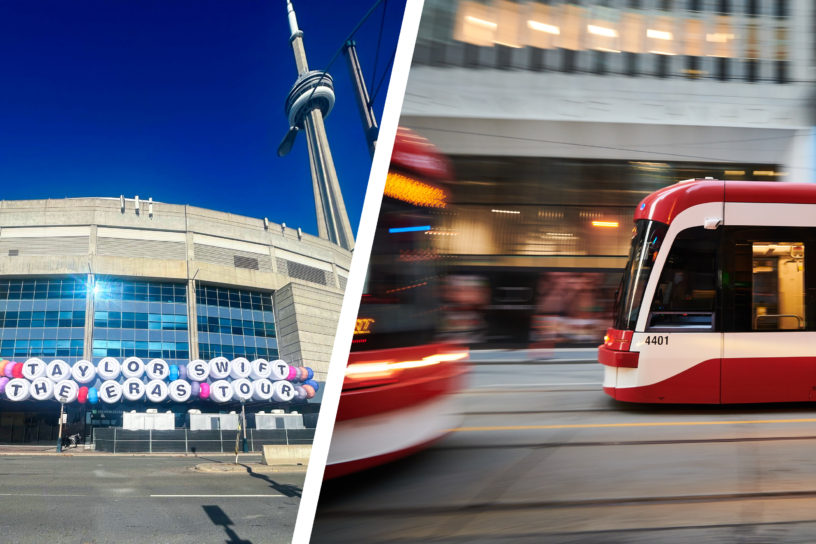By Jasmine Makar
The large commuter population at Toronto Metropolitan University (TMU) faces challenges as Taylor Swift’s six sold-out shows in Toronto as part of The Eras Tour continues to bring an influx of visitors to the city.
The City of Toronto has announced daily road closures around the Rogers Centre starting at 1 p.m. on each concert day, with additional closures after 10 p.m. to manage post-show crowds of approximately 50 to 60 thousand people each night from Nov. 14 to 16 and Nov. 21 to 23.
These temporary closures include the east and westbound Gardiner Expressway off-ramps and surrounding streets, which are scheduled to reopen at 1 a.m. following the concerts according to the city’s site.
The Toronto Transit Commission (TTC) has increased service during peak concert hours, adding service to Line 1 Yonge-University and Line 2 Bloor-Danforth as well as additional streetcars and buses from 5 p.m. to 8 p.m. and from 11 p.m. to 1 a.m.
However, these measures do not address daytime crowding that overlaps with student commutes from classes and exams.
GO Transit has implemented additional services on the Milton, Kitchener, Barrie and Stouffville lines after the shows finish and extra staffing at Union Station to help direct people to the venue. However, this does not account for off-hours when students and fans commute simultaneously.
Despite the City of Toronto’s measures, students say they’re experiencing longer travel times and crowded transportation as “Swifties” flood the city.
Sachit Thakur, a second-year computer engineering student at TMU who commutes to campus from Brampton using both the GO train and TTC, described the strain The Eras Tour has put on his commutes.
“Union [Station] itself is more full,” he said. “Especially when the show is over, all the trains are packed and you don’t get a spot to sit down…or you might have to even take the next train as it’s so full,” said Thakur.
He added that GO trains and the subway are facing frequent delays due to extended stops at stations caused by larger crowds commuting to the Rogers Centre.
Frédéric Dimanche, the director of the Ted Rogers School of Hospitality and Tourism Management program at TMU, highlighted the positive and negative impact of this large event on locals in Toronto and also workers trying to get around the city.
“You have people, you have crowds and that creates some problems,” he said. “That may create some problems for the people who come in, the visitors, but mostly for people who are from here.”
Dimanche added that students who come into the city are affected just as much as people who work in Toronto. He also pointed out the ongoing problems with the city’s transportation systems and the additional strain this event has placed on transit services.
“Keep in mind that Toronto is normally a disaster for transportation. It’s not working that well. So it could be worse in the next three days,” he said before Swift’s opening night on Thursday.
Gwen Titus, a second-year biomedical engineering student who lives in Toronto and attended Swift’s concert on Nov. 15, said she noticed an increase in people around the city. She acknowledged that it does not impact her as much as commuters since she doesn’t rely on public transportation to get to her classes in the city.
“Getting to the concert was definitely busier…I went at [around 5 p.m.] so that’s also kind of a busy time for travel,” she said. “There’s definitely a lot of people on the train and it was pretty cramped.”
Titus noticed the TTC had a larger-than-usual crowd during the evening rush due to the concert.
As the series of concert nights continue, the City of Toronto stated on their site that they “will debrief after every concert, adjusting closures as needed.”












Leave a Reply